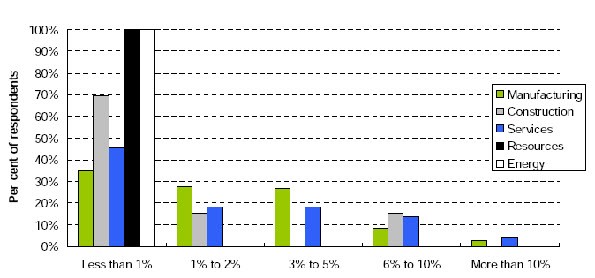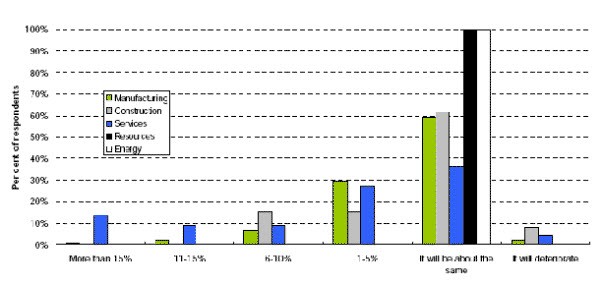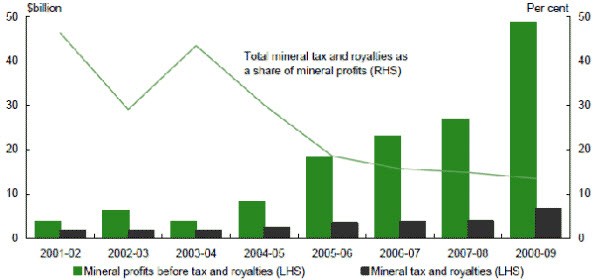Australia’s largest businesses are more than capable of looking after themselves, financially and in policy negotiations. Always have, always will, and rightly so. So it seems a little strange when the Australian Industry Group (AiG) and the Australian Chamber of Commerce and Industry (ACCI) shout loud for our largest companies, to the detriment of the vast majority of their members.
First, let’s take the proposed carbon price. Despite all the noise, what is being proposed will have only the smallest effect on all but a literal handful of companies. The AiG’s own research, which I’ll get to below, shows this very clearly. In any case, the government has said that businesses will be “assisted”. Many question the wisdom of that largesse — the small potential cost is quite avoidable by most businesses and, if they do take energy-efficient action, their investments will have a financial return that most businesses would be more than happy with.
A few weeks ago, the AiG released its research report Energy shock: confronting higher prices. Though its sample size was small, it tells a great story. Firstly, most companies spend very little on electricity — two-thirds spend less than 2% of sales (figure 1). Accordingly, very few do anything to reduce that cost, and very few intend to (figure 2). The cost of energy isn’t a big deal for most companies. If it was, business would be doing something about it.

Figure 1: What was your company’s electricity spend as a percentage of sales in 2009-10?
Source: AiG, “Energy shock: confronting higher prices”, February 2011

Figure 2: How do you expect your company’s energy efficiency to improve in the next 2 years?
Source: AiG, “Energy shock: confronting higher prices”, February 2011
A carbon price of $30 that might raise a firm’s electricity cost by a nominal 20% won’t make that big a difference to most firms. That’s a nominal 0.2%-0.4% rise in the cost of goods sold — not really enough to send a business to the wall, despite what Tony Abbott, Heather Ridout and Peter Anderson might claim. If anything, it’s the uncertainty that is debilitating.
Why do I say “nominal”? Because it’s avoidable. Companies who have looked at energy efficiency find that reductions of 5% to 10% per year are commonplace. There are strong government programs such as the NSW Energy Savings Credits to reduce the up-front cost. In any case, investment in energy savings has a typical return on investment of 30%-50% in the first year, and 15%-25% after that. Simple behaviour change programs greatly improve those returns. If the cost of energy or a reputation for sustainability is important, firms will act. But for most firms, it’s just not an issue. Those in the business of improving energy efficiency know that only too well.
For the many firms who are feeling pain from rising energy costs, a carbon price is the least of their worries. In NSW, IPART has confirmed that retail electricity will be 40% dearer in 2012-13, without a carbon price. The AiG research confirmed why: electricity prices have been rising, and will continue to do so, due to rising generation and network costs. The resources boom has increased costs for skilled labour, building and maintenance materials, and of course thermal coal prices. It notes that “Nearly 60% of Australian coal-fired generation capacity, including all of NSW’s coal plants, appears potentially exposed to these coal price movements”.
Network costs have risen by 58%-93% in NSW and Queensland over the past five years, and the underlying causes are only getting worse: rising per capita energy use and peak demand, past under-investment in network assets, and more rigorous licensing conditions imposed by governments to avoid unpopular blackouts. There are also stronger incentives for companies to seek higher capital allowances from regulators than there is to manage demand: that is, they are rewarded for network spend, but not to reduce energy use.
As the resource boom continues, all sectors pay more for labour, materials and energy, while interest rates may rise. If the AiG and ACCI were truly acting for their members, they would be trying to dampen these impacts, pointing members to energy efficiency programs, identifying the opportunities in low-emission and energy efficiency businesses, not scaremongering on a carbon price.
Indeed, far from helping to reduce the business costs of their members in these ways, both AiG’s Heather Ridout and ACCI’s Peter Anderson this week insisted on prolonging the uncertainty over the carbon price, further increasing generation and network costs, by backing Tony Abbott’s intention to ‘roll back’ this ‘great big tax’.
The carbon price is not the only policy issue on which ACCI, at least, has supported the big boys at the expense of its larger constituency. The resource rent tax was designed by the Henry Review to restore the national share of mining proceeds to historic norms (Figure 3), but more importantly as a targeted policy lever to slow down the pace of that mining and so get better returns from it in the medium term.

Figure 3: Mineral tax and royalties as a share of mineral profits
Source: Australian Government, Australia’s Future Tax System, December 2009, chart C1-1.
The resources boom is undeniably putting upward pressure on costs and interest rates for the whole economy. Yet ACCI was happy to risk rising interest rates for its members, and indeed lose a reduction in company tax, by cheering for the short-term profitability of some mining companies rather than the short- and medium-term interests of its members.
As we’ve seen, those miners are in very healthy shape and well able to look after themselves in Canberra. As indeed are our heaviest emitters, trade-exposed or not. It’s not so clear who is looking after the other 1,100,000 businesses in Australia.
*Josh Dowse is an independent consultant on sustainable business and investment. This first appeared on Business Spectator







Neatly explains the major reason I refuse to join an industry group – they don’t represent small business. Last year Business SA advocated against the MRRT despite the fact that most of its membership would benefit from both the lower corporate tax rate that was part of the package and the slowing down of the mining sector which is, in our case, forcing us to switch manufacture from Australia to Asia.
Much as though I support a Carbon Tax, I think the premise behind this article is flawed in a very basic way.
The only two variables which are considered here are the proportional amount companies spend on electricity, and companies expectations of energy efficiency improvements over the next few years.
The Author concludes that because the bulk of companies surveyed, spend 2% of sales or less on electricity, they will not be impacted significantly by a carbon tax. The author goes on to conclude that because most companies surveyed do not expect their energy efficiency to improve in the next two years, therefore most companies are not interested in improving energy efficiency.
Both conclusions are based on faulty logic.
I can only speak for my home state of Western Australia, but considering it is the economic powerhouse of the country at present due to the resources boom, this is a critical sector of the Australian economy. Having recently read the Western Australian Governments’ Strategic Energy Initiative Discussion Paper, I can tell you that the main concern arising from a carbon tax, for business, is not actually electricity prices.
W.A.’s Primary Energy consumption is actually broken down as follows:-
23 % – Resources Industry
27 %- Manufacturing Industry
19 % – Electricity Generation (Industry, commercial and domestic)
21 % – Transport Industry
4 % – Residential
3 % – Commercial
3 % – Other
So, as you can see, the resources, manufacturing and transport industries have a whole heck of a lot of energy consumption which does not involve electricty. In the case of transport, it’s pretty obvious; They burn petrol, LPG or diesel to move products from A to B. This will attract Carbon Tax which will increase costs significantly, and these costs will be passed on to consumers – in many cases other businesses. The same applies for resources and manufacturing. 98 % of the states energy comes from fossil fuels of one kind or another, and the manufacturing, resources and transport industries are all supplying inputs to all the other business sectors.
It is very easy to see that there is a lot more to consider than electricity prices when considering the impact of a carbon tax on business. The author’s focus on this aspect alone is either an attempt to be intentionally misleading, or a breathtaking display of a lack of commercial acumen, which should preclude being taken seriously on economic matters.
The second point is that just because companies don’t envisage improvements in energy efficiency over the next two years, doesn’t mean they don’t care, or it’s not a priority for them. Unless the author has been living under a rock ever since the capitalist system came into being, the author would be aware that identifying and implementing cost savings wherever possible, and maximising efficiencies of all kinds, is an integral part of a successful business model. It could be (and I suspect it is) that the reason most companies don’t see their energy efficiency improving in the next two years, is because they already believe they are as efficient as they can get. Note that energy efficiency is related to, but is not the same thing as, Carbon Dioxide emissions.
I am all for a Carbon Tax and it’s likely implications for our economy, our society and our environment. But in order to argue the case successfully, we need a whole world more diligence, attention to detail, and comprehension of the ramifications of a Carbon Price, than is shown by this simplistic and superficial analysis.
Captain Planet if you think most companies “already believe they are as efficient as they can get” you’re completely deluded. Ask any idiot whether there are electricity savings to make at their place of work and they’ll give you a list a mile long. Try air conditioning unused rooms/spaces for starters, not to mention switching off lights. I reckon any business, big or small, could cut its energy costs by 5% if they had to without any impact whatsoever. When there’s a solid price signal to save energy, businesses will respond effectively. What will destroy the benefits of a carbon tax will be the inevitable whinging from the rent-seekers, especially the mining industry who’ve elevated complaining to an effective, and destructive artform.
Hi Peteyboy,
Fair enough.
A more accurate assessment would be that most companies presently believe they have made all the energy efficiency gains that are economically worthwhile, hence do not believe their energy efficiency will improve any time in the next 2 years.
remember, we’re not talking just about electricity here – in most cases, we’re talking about other forms of energy conversion – diesel fuel to mechanical energy, in the case of mining. Considering the Superpit in Kalgoorlie goes through over a million litres of diesel every week, I promise you they have been through their energy consumption metrics with a fine toothed comb. An airconditioner or a few lights left on are small change as far as these guys are concerned.
If the Superpit could reduce their energy consumption by 5 % without any impact, this would save them $50,000 + per week, even allowing for the fact that all of their mining truck fuel is diesel excise exempt. This translates to $2.5 million dollars per year. If these kind of efficiency savings were available without impact, as you suggest, they’d be all over it. Believe me.
It is true that energy efficiency gains remain to be made – mostly they are in changing the habits of employees, and mostly, as you have pointed out, in consumption from appliances very similar to those we have at home – lights and airconditioners. These make up such an infinitesimal fraction of the energy consumption of big business, that the cost savings to be made are outweighed by the cost of running an education campaign, or installing devices to reduce consumption.
What you say is true, but don’t lose perspective. The lion’s share of energy consumption in business is very inelastic. Where a Carbon Tax is going to start to have some impact is that it will encourage business to begin sourcing its energy from renewable sources instead of burning fossil fuels. There are efficiency gains to be made, but the real difference will be made by changing the source of the energy.
All realistic projections show that energy consumption for the entire world are going to go up over time. Reducing energy consumption has a role to play, but to be honest it’s function is as a short term measure to buy us some breathing space while we convert our energy supplies to renewables.
Peteyboy/Captain Planet;
Whilst there are probably legions of workers, right up to middle management, site engineers and many more that can walk you through their premises and demonstrate and show the waste of energy, that’s a way from the people who make the decisions to become more efficient and even further away from a process of staff training that changes the culture of energy waste.
The WA government tried to change the energy waste culture in their own buildings – dismal failure.
And there is something here that is worse. That is the greenwash that we see regarding the “low” energy building. Show me the energy bills after one year post occupancy. Then award the accolades if you can. Better yet, remove that sludge word “sustainable” from the building lexicon until we get it right.